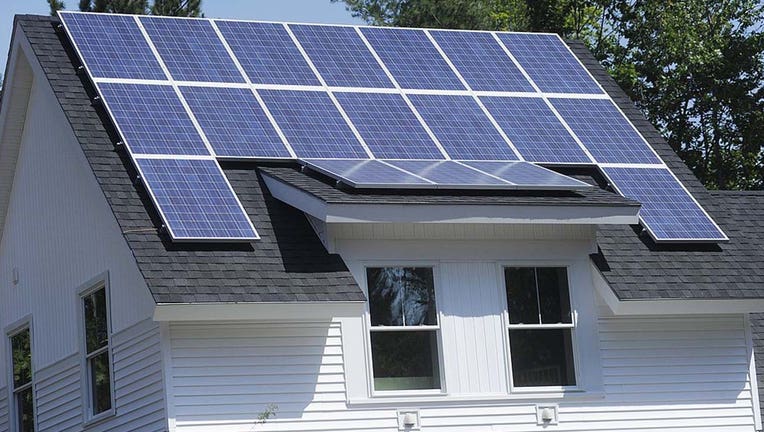Bill to slash rooftop solar credits passes in State Assembly

FILE - Solar panels on a net-zero home.
OAKLAND, Calif. - The California State Assembly on Tuesday night passed a controversial energy bill that would break a promise to residents who have installed solar panels on their property.
AB 942, which was authored by Assembly Member Lisa Calderon (D-San Gabriel), a former Southern California Edison lobbyist, would impact the nearly 2 million Californians whom the state promised would, for 20 years, be able to sell excess power back to the utility companies at the same rate as the companies charge.
If passed, that guarantee would be negated if the owner decides to sell their property. The new owner would only be able to sell excess power for 25% of what the utility charges.
Solar incentives
The backstory:
California home or business owners who install solar panels enter an agreement with their utility company through the Net Energy Monitoring (NEM) program, a legally binding agreement — per the language of the contract — that guarantees compensation for 20 years. The document states the guarantee is tied to the solar system, not the property owner, meaning a new buyer would be grandfathered into the program at the same rate.
A 2023 update, NEM 3, significantly reduced the rate of compensation for solar systems installed after April of that year. AB 942 would negate the grandfather clause, so people buying a home with a pre-2023 solar system would be compensated at the NEM 3 rate.
An earlier version of the legislation would also have cut the compensation period from 20 years to 10, but that clause was removed after public outcry.
Pro and anti
What they're saying:
Calderon has said the bill is necessary because solar users, who are less reliant on power companies, cover less of the cost of maintaining power infrastructure, leaving their non-solar neighbors to pick up the tab. She says her bill would reduce 10 million Californians' power bills by $423 million in 2026.
Nearly 100 environmental justice and community organizations signed a letter to lawmakers warning that passing AB 942 would "gut consumer confidence and trust in government, right when we need more Californians to make the choice to invest in clean energy technologies."
Dave Rosenfeld, the executive director of the nonprofit organization Solar Rights Alliance, said the bill is state leaders "covering their butts."
"Energy rates are high because of utility overspending. Politicians and regulators have failed to reign in that spending, and now they need someone to blame, so they're scapegoating rooftop solar," Rosenfeld said. "They're blaming solar customers for a problem that was created by utilities and politicians that let the utilities off the hook time and time again.
High rates, high profits
Why you should care:
California's energy rates are the second-highest in the country after Hawaii.
The state's nonpartisan Legislative Analyst's Office reported in January that electricity costs have increased between 48% and 67% between 2019 and 2023, largely due to wildfires. Ratepayers have been covering the cost of upgrading utility infrastructure and undergrounding power lines.
Pacific Gas and Electric, one of California's three major power companies, was held responsible for multiple fires, including the 2018 Camp Fire and the 2021 Dixie Fire.
The company announced in February that it had made a record $2.47 billion in profit in 2024, the second year in a row it had broken its own profit record. State legislators in 2024 allowed utilities to raise rates on consumers six separate times.
Projections of the company's 2025 profits show it's poised to break records yet again.
A fight over costs
By the numbers:
Advocates for AB 942 say the NEM program in 2024 cost non-solar ratepayers $8.5 billion. That number was drawn from an analysis by the California Public Utilities Commission Public Advocates Office in 2024, which cited a surge in solar installations before the NEM 3 rates took effect, and high compensation for the power those systems generate.
However, a privately conducted 2024 study, endorsed by more than a dozen energy economists, states that claim is erroneous, and that the solar system would actually save ratepayers $1.5 billion in 2024. That document states the CPUC study miscalculates rates and overestimates solar energy output, and fails to account for the reduced demand on the grid that solar energy facilitates.
On to the senate
What's next:
AB 942 is set to come before the State Senate at an undetermined future date.

